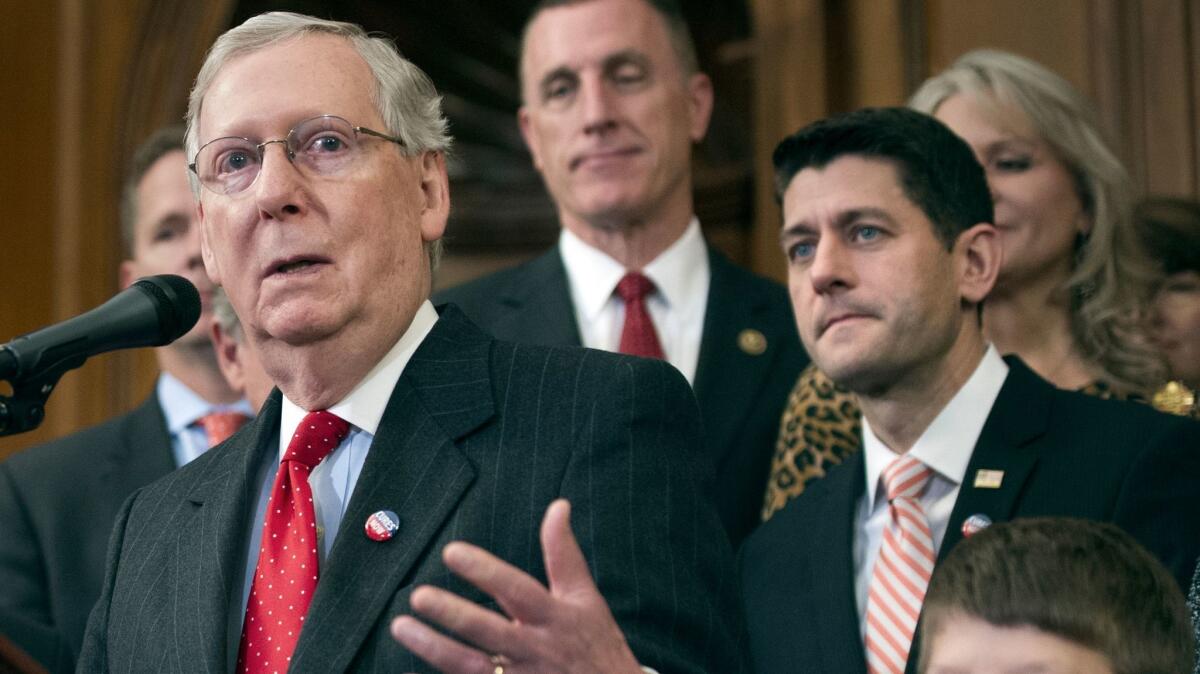Senate backs stopgap spending bill, averting a government shutdown

With less than hour to spare, the Senate late Friday backed legislation averting a government shutdown as coal-state Democrats retreated on long-term healthcare benefits for retired miners but promised a renewed fight for the working class next year.
The 63-36 vote sent the stopgap spending bill to President Obama for his signature before a midnight deadline.
It came hours after Democrats dropped threats to block the measure in hopes of using the shutdown deadline to try to win a one-year respite for 16,500 miners facing the loss of healthcare benefits at year’s end. Instead, the legislation provides benefits for four months, at a cost of $45 million.
Democrats evoked President-elect Donald Trump, whose economic message resonated strongly with the working class in coal country, in pressing for more benefits. Sen. Joe Manchin III (D-W.Va.), who has been mentioned as a potential member of the Trump Cabinet, led the fight of coal-state Democrats.
But House Republicans were unrelenting — and had already vacated the Capitol for a three-week holiday — forcing Democrats to concede. Manchin acknowledged Friday night that he did not have the votes to block the bill, but said that “the fight will continue” next year.
“I’m born into a family of coal miners. If I’m not going to stand up for them, who is?” he told reporters.
Manchin is meeting with Trump on Monday.
The fight gave Democrats, whose election defeat a month ago was largely due to dwindling appeal among working-class voters, a chance to cast themselves and not the GOP as the champion of the worker. Manchin was joined by other coal-state Democrats who face reelection in 2018 in states Trump won, including Pennsylvania and Ohio.
“We’re just getting warmed up,” said Sen. Bob Casey (D-Pa.), also promising a fight next year. “These miners and their families kept their promise, put their lives at risk. ... It’s not too difficult for a senator or House member to keep a promise.”
The dispute over health benefits and a separate fight over legislation to shift more of California’s scarce water resources to inland farmers were the final battles of a two-year session marked by constant quarreling. It was capped by a burst of productivity on legislation to authorize hundreds of water projects, repair the lead-tainted water system in Flint, Mich., and keep the government running through April.
Congress will reconvene on Jan. 3 to get a swift start on repealing key elements of the Affordable Care Act and confirming Trump’s Cabinet.
The underlying funding bill would keep the government running through April 28 to buy time for the incoming administration and Congress to wrap up more than $1 trillion in unfinished agency budget work. It also provides war funding, disaster aid for Louisiana and other states, and an expedited process for confirming Trump’s choice for Defense secretary, retired Marine Gen. James Mattis.
The trucking lobby won permanent relief from recent Transportation Department rules mandating more rest and overnight breaks for long-haul drivers. And the White House and some Republicans were denied in a bid to revive the Export-Import Bank’s ability to approve export financing deals exceeding $10 million.
The miners’ issue had history. Seventy years ago, President Harry S. Truman guaranteed a lifetime of health and pension benefits for retired miners to avert a strike.
Senate Majority Leader Mitch McConnell (R-Ky.) said the four-month extension was better than nothing. McConnell, who represents thousands of miners in the struggling coal industry, said he tried to get a longer-term solution in talks with House Speaker Paul D. Ryan (R-Wis.).
“Would I have preferred that provision to be more generous? Of course I would have,” he said in a speech on the Senate floor.
The House had left town on Thursday, creating a dynamic in which the Senate had little choice but to adopt the stopgap measure. Both the funding measure and a water projects bill passed the House by sweeping bipartisan votes.
Democratic opponents of the popular water projects bill, led by retiring Sen. Barbara Boxer of California, assailed provisions to divert more water to corporate farmers. A vote to overcome a filibuster of that measure, which would also clear the way for long-delayed funding of $170 million to help Flint fix its lead-tainted water system, was to follow action on the stopgap spending bill.
Democrats griped that GOP negotiators on the water bill rejected a permanent “buy America” provision that would have required U.S.-produced steel be used in water projects. But that effort lost steam Friday.
The spending bill also would provide $7 million to reimburse the New York Police Department for the cost of security around Trump Tower in Manhattan, far less than the $35 million the city requested.
ALSO
Sen. Barbara Boxer pledges filibuster as one of her last acts
Clinton won as many votes as Obama in 2012 — just not in the states where she needed them most
The Trumpification of Washington has already begun, and residents wonder how he will change the city
More to Read
Get the L.A. Times Politics newsletter
Deeply reported insights into legislation, politics and policy from Sacramento, Washington and beyond. In your inbox three times per week.
You may occasionally receive promotional content from the Los Angeles Times.






